In Rue Valley you role play a guy with poor mental health. He wanders around a crappy motel, stuck in the same old patterns of life, seemingly unable to escape his inner demons. When confronted with the premise for this upcoming RPG you may have one of two reactions. The first: you will say "lol, it me" with enough humour to wishlist it on Steam and earmark it for the future. The second: you will mutter "ugh, it me" and be immediately put off by the idea of having to tolerate an entire second layer of psychological hangups.
There is a third secret reaction though... you might think: oh, this looks a lot like Disco Elysium, but in the real world.
You're right. From the brief demo I've seen played, Rue Valley has some very similar elements. It has that top-down perspective, a focus on conversations over combat, and plenty of interactive fiction style dialogue prompts running down one side of the screen. Even the motel room where you begin your adventure is reminiscent of the hotel in which you wake up in the city of Revachol. In terms of art, it shares some of the painterly brush strokes of ZA/UM's work, but adds the jittering frames and twitching line art of the Spiderverse movies for good measure.
Given all this, you might even say that developers Emotion Spark Studio are unofficially contending with the seemingly endless parade of other studios racing to create a spiritual successor to the sad cop sim. But unlike the sci-fi sex resorts or vague "psychogeographic" adventures, this story is a more grounded time loop tale. It's our world, except you're trapped repeating the same 47 minutes of the day, and must find out why.
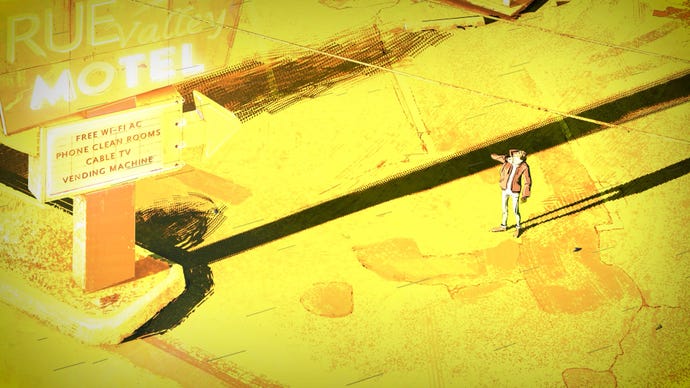 Image credit: Owlcat Games
Image credit: Owlcat Games
It has some other distinctions. Unlike the surreal "thought cabinet" of Harry DuBois, the "hero" of Rue Valley has his own swirling inner monologue to contend with, replete with simply labelled emotions, recognisable to any human who's taken an online personality test. Basically, your character swivels upon three axes of temperament. Introverted vs extraverted. Sensitive vs indifferent. Impulsive vs calculating.
You'll have some control over how these see-sawing spectrums of personality swing, but often you'll be at the mercy of the world itself affecting your mood. Get too far along the "sensitive" track and you might have a panic attack or burst into tears while in therapy (the start of every loop begins with a therapy session). Go too far along the impulsive spectrum and you'll become "impatient" making some choices, like simply waiting for time to pass, impossible. Find yourself too deep down the extroverted spectrum and you'll be marked as "arrogant", which is it's own big problem.
Each trait opens up new dialogue options with other characters (or in some cases, makes dialogue unuseable). At one point you have to wait for a receptionist to finish her personal phone call before dealing with you. Being "arrogant" unlocks the option to shout at her and demand to see the manager. Being "dramatic" lets you make an exaggerated stink about how long you had to wait for her to serve you. ("It felt like months!")
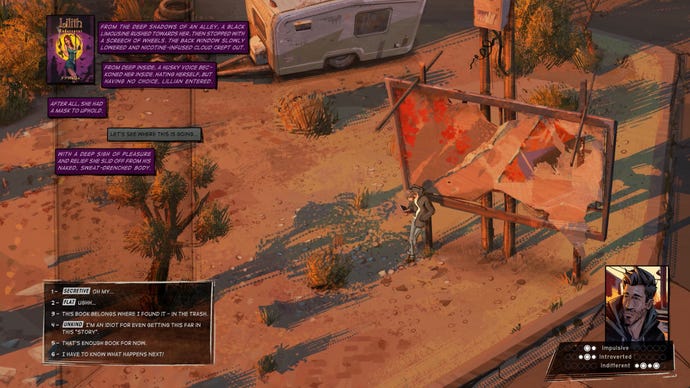 Image credit: Owlcat Games
Image credit: Owlcat Games
"The themes the game is dealing with are more about the mundane stuff we experience every day," says Marko Smiljanic, Chief Creative at Emotion Spark. "Because we're dealing with an individual and his personality, and how his emotional and mental state is."
That commitment to the mundane extends to the status effects you'll receive as you play. There's no "poisoned" or "cursed" here (at least none I've seen) but there is a status called "sore legs" which strikes you if you stand around in one place for too long, say, waiting for an irksome receptionist to hang up her call. There's also the simple "thirsty" status, which will add a pip to your impulsive spectrum, sometimes pushing you into "impatient" territory. The grandaddy of all status effects I saw during the short demo was "total lack of motivation". In other words, this is a video game in which you can contract ennui.
Exactly what causes the time loop to occur isn't clear. You just see a bright light growing in the distance, which quickly envelops everything and sees you waking up in front of your therapist again. Even though the time loop repeats, you'll be launched into that next loop with a mood that is likely different since your last therapy session. Which means you're getting funelled down new dialogue trees every loop. A result of having developed a new state of mind.
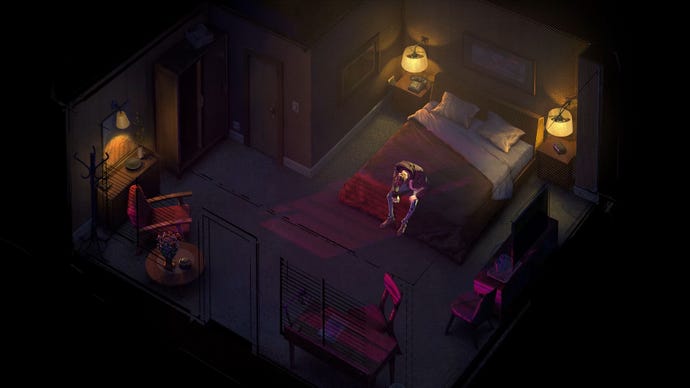 Image credit: Owlcat Games
Image credit: Owlcat Games
It sounds interesting, in the psychological sense, if not traditionally exciting in terms of video game mischief. There is a distinction in psychology between "states" and "traits" that the game seems to want to explore. There's also the mild phenomenon many feel of being "stuck" in life; the goal of therapy in these cases is to become "unstuck". Handy then that this is also the emotional anchor of a time loop story - the protagonist is reluctant to change, or simply does not know how to change. Until they learn more about themselves, they will see and feel the same things day in, day out.
But what happens between those days? Well, when you sleep in Rue Valley's dingy motel room your memories of recent interactions will float around in a reverberating void. This is both to help the player keep track of characters and quests, but also leads to a deeper level of your dark subconscious, where "coccooned" memories repressed by the protagonist have to be slowly unlocked and addressed over the course of the game. Creative lead Smiljanic calls it their way of "getting around the amnesia trope." But he also hopes the game will give people some insight into their own downers and dead-brainedness in real life.
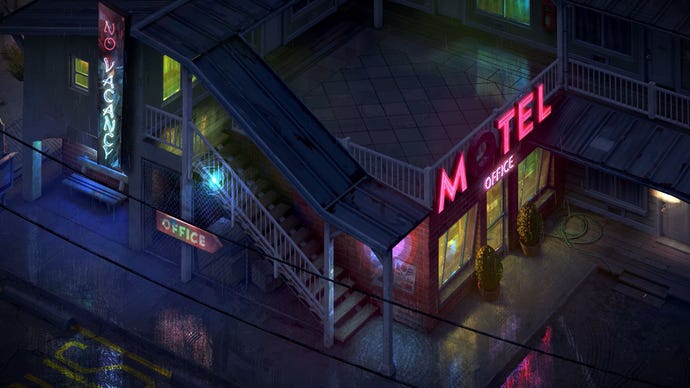 Image credit: Owlcat Games
Image credit: Owlcat Games
"I kind of like to think that we're using familiar game mechanics, that have been established throughout the years... and that people will find themselves in these mechanics, and you will realise that you are not willing to get out of bed because of whatever is going on in your life [and] you will notice this 'notification', that you have a 'total lack of motivation' and that you have to deal with it somehow."
It all reminds me of Vampire Therapist, which was inspired as much by cognitive behavioural therapy as it was by bloodlusty neck-biters. I can't tell from this demo alone whether Rue Valley's story of one dude feeling shitty will play with similar themes of personal development and mental health in an interesting way (especially when it stands so close to that other depressed dude in a weird necktie). But we'll keep an eye on him. For now, I'm afraid we've come to the end of the session.

 1 month ago
76
1 month ago
76
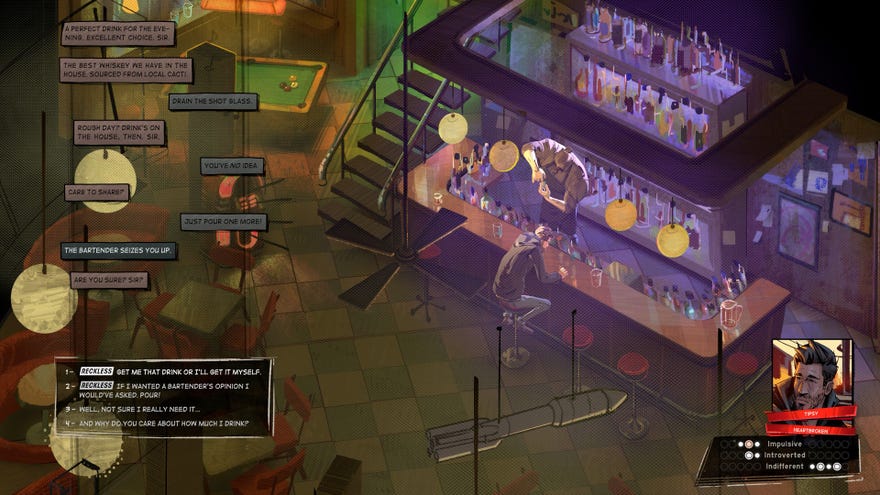


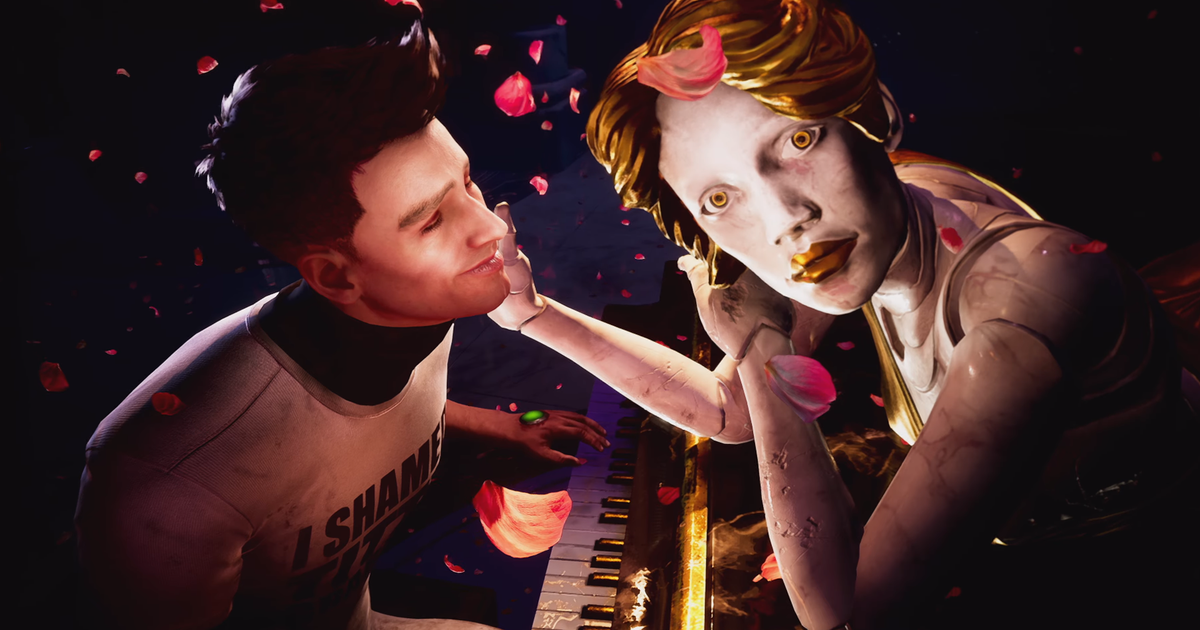




![Anime Reborn Units Tier List [RELEASE] (November 2024)](https://www.destructoid.com/wp-content/uploads/2024/11/anime-reborn-units-tier-list.jpg)
